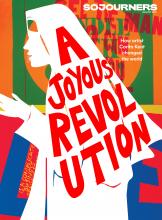TERRITORY. COLONY. COMMONWEALTH. “An island surrounded by water, big water.” Boriquén.
In 2017, when Hurricane María hit and Puerto Ricans were left without power for months, people around the world Googled: “What is Puerto Rico?”
A strip of land 100 miles long and 35 miles wide in the Caribbean Sea. Home to nearly 3.2 million people, “proud people,” as my abuela says. It is an island of people in la brega, an expression without a translation that encapsulates “a state of mind,” Alana Casanova-Burgess explains in La Brega, a WYNC podcast series. It’s the feeling of always being in the struggle, the hustle. “It shows us something about our ‘Puerto Ricanness,’ our history, our present,” she says. “And maybe where we’re headed.”
This year, Steven Spielberg will release his screen revival of the hit musical West Side Story. It’s been 60 years since Rita Moreno as Anita sang, “I like to be in America” from a staged New York City rooftop (muddying the waters as to whether Puerto Rico was “America”). As a new Anita emerges, Congress will debate the Puerto Rico Statehood Admission Act, introduced in March. If the act is approved, then a vote will be held in Puerto Rico on whether to become a state.
Read the Full Article

